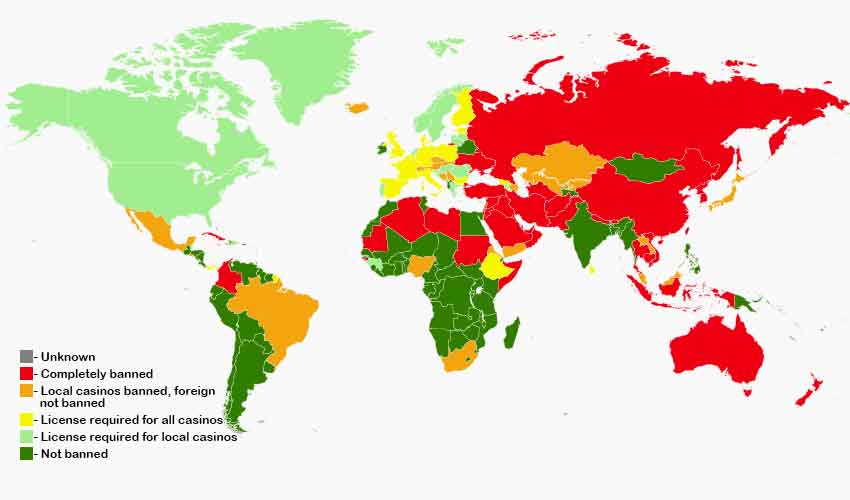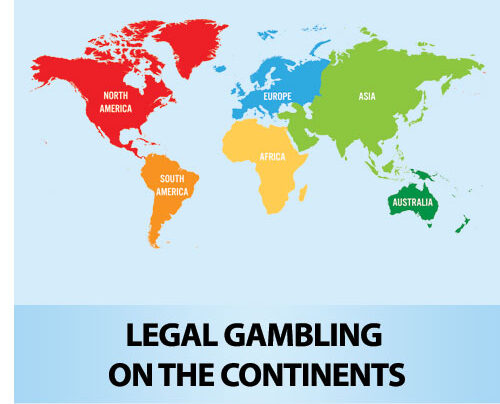Determining the legality of gambling in your country can be a complex task, as laws vary widely across different jurisdictions. While some nations have embraced gambling as a legitimate form of entertainment, others have strict prohibitions or regulatory frameworks that can make participation daunting for players.
In general, the legality of gambling is shaped by multiple factors, including cultural attitudes, societal norms, and government regulations. Various forms of gambling have different legal statuses—ranging from casinos and sports betting to online gaming and lotteries. Additionally, many countries differentiate between land-based and online gambling, often subjecting them to different sets of rules.
For instance, in the United States, the legality of gambling is largely determined at the state level, leading to a patchwork of regulations—some states have legalized various forms of online betting, while others maintain stricter prohibitions. In contrast, European countries tend to have a more unified regulatory approach, though individual countries still impose their own specific rules regarding gambling activities.
It’s essential for players to research their local laws before engaging in any form of gambling. Not only does this help avoid potential legal issues, but it also ensures a better understanding of any consumer protections or resources available for responsible gaming. Players often consult government websites, legal resources, or even local news outlets for the most current regulations affecting gambling in their area.
For those considering online gambling, it’s important to recognize that legality can also depend on the gambling operator. Many online casinos may operate legally in one jurisdiction while remaining unlawful in another. Thus, players should verify that any platform they choose to use is licensed and regulated according to their locality’s laws.
In summary, the question of whether gambling is legal in your country is nuanced and requires careful scrutiny of both overarching laws and specific regulations. Keeping informed and understanding the legal landscape can help ensure a safe and enjoyable gaming experience.

Understanding Local Regulations
When considering whether gambling is legal in your country, it is essential to understand the specific regulations that govern this industry at both national and local levels. Laws can vary significantly depending on where you are, and these regulations can dictate what types of gambling are allowed, where they can take place, and who can participate.
Many countries have vast legal frameworks that encompass various aspects of gambling, including online gambling, sports betting, and casino operations. It is important to familiarize yourself with these regulations to avoid any legal repercussions. Here are some key factors to consider:
- Types of Gambling: Not all forms of gambling are legal everywhere. In some regions, land-based casinos may be allowed, while online gambling or sports betting may face stricter restrictions or may be completely prohibited.
- Licensing and Regulation: Countries that permit gambling often require operators to obtain licenses. These licenses are regulated by national or regional authorities, which establish rules and guidelines to protect consumers and ensure fair play.
- Age Restrictions: Most jurisdictions impose age limits on gambling activities. Typically, individuals must be at least 18 or 21 years old to gamble legally. It is vital to verify these age requirements to avoid legal issues.
- Taxes and Winnings: Legal gambling may also come with specific tax obligations. Depending on your jurisdiction, you could be required to pay taxes on your winnings, so it is advisable to understand these regulations fully.
- Responsible Gambling Policies: Many countries also implement responsible gambling measures to protect players. These policies may include self-exclusion programs, limits on bets, and obligations for operators to provide resources for problem gambling.
Before engaging in any gambling activities, make sure to conduct thorough research regarding the laws in your country or region. Consulting official government websites or legal resources can provide clarity and guidance tailored to your specific circumstances.
Ultimately, understanding local regulations not only helps ensure you’re complying with the law but also promotes a safer and more enjoyable gambling experience.
How VPNs Affect Access to Casinos
Virtual Private Networks (VPNs) have emerged as a popular tool for online gamblers seeking greater access and privacy. However, their use in the context of online casinos is complicated and varies significantly by jurisdiction.
In countries where online gambling is restricted or illegal, many users resort to VPNs to bypass geographical limitations and access international casinos. By masking their IP address and re-routing their internet connection through a server located in a country where gambling is permitted, players can appear as though they are operating from a legal jurisdiction.
That said, the use of VPNs comes with inherent risks and legal implications:
- Legal Consequences: Engaging in gambling through a VPN in jurisdictions where it is prohibited can lead to legal penalties. Users must be aware of the laws in their country regarding online gambling and VPN usage.
- Casino Policies: Many online casinos have specific terms and conditions that prohibit using VPNs to access their services. If detected, players may face account suspension, seizure of winnings, or other punitive actions.
- Security Risks: While VPNs can enhance privacy, not all providers are trustworthy. Some may log user activity or expose users to malware. Therefore, it is crucial to select a reputable VPN service with a solid privacy policy.
- Payment Issues: Even with a VPN, players might face difficulties when processing deposits or withdrawals. Payment systems may flag transactions that originate from unusual locations, delaying access to funds.
Ultimately, while VPNs can expand access to online casinos, players must weigh the potential benefits against the legal and practical risks associated with their use. Staying informed and compliant with local laws is essential to ensure a safe and enjoyable gambling experience.
Playing safely and legally
As the world of online gambling continues to evolve, ensuring that you play safely and within legal boundaries is more important than ever. This not only protects your financial interests but also enhances your overall gaming experience. Below are essential considerations to keep in mind when engaging in gambling activities.
1. Verify Licensing and Regulation
Before playing at any online casino, check if it’s licensed and regulated by a reputable authority. This information is often displayed on the website’s footer. Look for licenses from recognized jurisdictions such as:
- United Kingdom Gambling Commission
- Malta Gaming Authority
- Gibraltar Regulatory Authority
Playing at licensed casinos ensures that they adhere to fair practices and consumer protection standards.
2. Know Your Local Laws
Understanding the gambling laws in your country is crucial. If you live in a region where gambling is illegal or heavily restricted, engaging in online gambling can lead to legal repercussions. Always stay informed about changes in legislation that might affect your eligibility to play.
3. Use Secure Payment Methods
Select payment options that provide both security and convenience when making transactions. Avoid using wire transfers or cash payments, which do not offer any consumer protections. Opt for trusted methods such as:
- Credit and debit cards
- E-wallets like PayPal, Skrill, or Neteller
- Cryptocurrencies
These options enhance your security and ensure your funds are managed responsibly.
4. Practice Responsible Gambling
Set personal limits on time and money spent gambling. Online casinos often provide tools to help you manage your gambling habits, including:
- Deposit limits
- Session time reminders
- Self-exclusion options
By employing these responsible gambling measures, you can enjoy a safe experience without risking financial distress.
5. Be Cautious with Bonuses and Promotions
While bonuses can enhance your gaming experience, be wary of terms and conditions that might come with them. Always read the fine print to understand wagering requirements and any other limitations. This knowledge can save you from unexpected challenges when attempting to withdraw your winnings.
Conclusion
Playing safely and legally in the gambling arena requires diligence and awareness. By verifying licensing, understanding local laws, choosing secure transactions, practicing responsible gambling, and being cautious with bonuses, you can enjoy the thrill of online gambling while minimizing risks.

